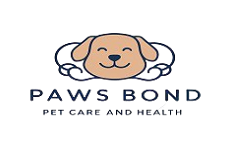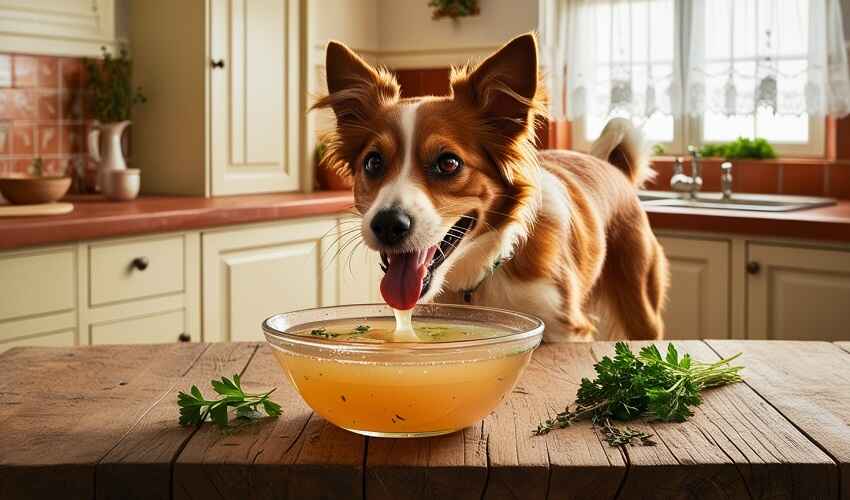It can be quite tempting to give your dog chicken broth, particularly if they’re sick or just need a bit more taste in their food. Chicken broth is frequently praised for its ability to please picky eaters and possible health advantages. Nevertheless, before adding chicken broth to your dog’s diet, there are a few crucial things to remember. While store-bought versions of chicken broth may contain additives, preservatives, or excessive sodium, which can be unhealthy to dogs, homemade chicken broth can be a beneficial supplement to your dog’s food. Furthermore, several popular additives in chicken broth, such garlic and onions, can be hazardous to dogs and should be avoided. It’s critical to comprehend the advantages and possible drawbacks of giving your dog chicken.
Is Chicken Broth Good for Dogs?
Chicken broth can be beneficial for dogs when used in moderation and made from natural, unseasoned ingredients. It can add flavor and moisture to your dog’s food, making it more appealing, especially for picky eaters. Additionally, chicken broth may provide some nutrients and hydration, particularly for dogs who are sick or recovering from illness. However, it’s crucial to avoid store-bought broths that contain additives, preservatives, or excessive sodium, as these can be harmful to dogs. Always opt for homemade chicken broth made from simple, dog-safe ingredients, and consult with your veterinarian before incorporating it into your dog’s diet.
Can dogs have chicken bone broth?
When made correctly, chicken bone broth is safe for dogs to eat. Dogs can benefit from homemade bone broth produced from chicken bones in a number of ways, including better digestion, hydration, and joint support. A tasty and nourishing broth is produced by slowly boiling the bones to release their minerals, collagen, and other elements. But you must exercise caution and make sure the bones are cooked all the way through and have no sharp edges that could sever your dog’s throat or harm its digestive system. Furthermore, don’t include any substances that are poisonous to dogs, such garlic or onions. As with any new meal, gradually add chicken bone broth to your dog’s diet and keep an eye out for any negative responses.
Advantages of Including Chicken Broth in Your Dog’s Diet
Enhanced Hydration: Chicken broth helps your dog stay hydrated by adding moisture to their diet, which is especially beneficial for dogs who might not drink enough water.
Enhanced Palatability: Your dog’s meals may taste better thanks to the delicious taste of chicken broth, which may entice finicky eaters to eat them.
Nutrient Boost: Extra nutrients, such protein, vitamins, and minerals, from homemade chicken broth can improve your dog’s general health and wellbeing.
Digestive Health: The mild warmth of chicken broth helps ease gastrointestinal discomfort and conditions like diarrhea by calming the digestive system.
Joint Support: Collagen, glucosamine, and chondroitin found in bone-based chicken broth promote joint health and mobility: this is especially advantageous for elderly or arthritic dogs Weight management: You can help your dog lose weight by increasing their satiety without putting them on more calories by adding low-calorie chicken broth to their meals.
Recovery Aid: As a source of nutrition and comfort throughout the healing process, chicken soup is frequently suggested for dogs recovering from disease, surgery, or appetite loss.
All things considered, adding chicken broth to your dog’s food might be an easy and advantageous method to improve their health and nutrition. To guarantee the best option for your pet, always choose commercial low-sodium dog broth or homemade broth.
Safety Measures for Offering Chicken Broth to Your Dogs
It’s crucial to observe these precautions while giving your dogs chicken broth:
Homemade Broth: Make your own chicken broth at home with basic, dog-safe ingredients; steer clear of store-bought broths, which could be high in sodium, additives, or preservatives.
Plain and Unseasoned: Use chicken broth that is plain and unseasoned; do not add any salt, onions, garlic, or other substances that may be toxic to dogs.
Cool Before Serving: To avoid burns or damage to your dog’s mouth or throat, let the chicken broth cool to a safe temperature before giving it to them..
Moderation: Give your dog chicken broth occasionally as an addition to their normal food, but never as a full meal or as a substitute for water.
Watch for Allergies: After adding chicken broth to your dog’s diet, keep an eye out for any indications of allergic reactions or stomach distress. If these things happen, stop using the broth immediately.
See your Veterinarian: If your dog has any dietary restrictions or underlying medical concerns, make sure to contact with your veterinarian before adding chicken broth to their diet. This will ensure that the broth is safe and suitable for your dog’s needs.
You can safely give your dogs chicken broth as a tasty and nutritious addition to their diet by according to these safety precautions.
Recognizing the Toxicity of Onions for Dogs
It is vital to understand that onions are harmful to dogs in order to ensure their wellbeing. Hemolytic anemia is a disorder that can result from oxidative damage to a dog’s red blood cells caused by substances found in onions called thiosulfates. If your dog consumes onions, look out for the following symptoms:
Gastrointestinal upset: This condition can cause nausea, vomiting, diarrhea, and abdominal pain.
Lethargy: Your dog might seem feeble, worn down, or unmotivated to move.
Pale Gums: Examine your dog’s gums; if they seem devoid of a vibrant pink hue, anemia may be the cause..
Higher Heart Rate and Respiratory Rate: Your dog may breathe quickly or forcefully, as well as have a higher heart rate.
Dark Urine: Because onions contain chemicals that break down hemoglobin, they can alter the color of urine, making it dark red or orange.
Determining the Harmful Quantity of Onions for Dogs
It is difficult to determine the dangerous amount of onions for dogs because it varies on a number of factors, including the dog’s size, amount consumed, and sensitivity. Generally speaking, though, even tiny quantities of onions can be harmful to dogs. Toxic effects can result from a dog consuming as little as 0.5% of its body weight in onions.
For instance, about 1 ounce of onions would be sufficient to possibly cause poisoning in a 20-pound dog. Onion toxicity symptoms might vary in intensity and may not show up right away based on how much is consumed.
In the event that you believe your dog has consumed onions or anything that contains onions, you must contact a veterinarian right once. In order to minimize the symptoms of onion poisoning and guarantee your dog’s wellbeing, your veterinarian can evaluate the situation and administer the proper therapy.
Assessing the Risk: Can a Small Amount of Onion Harm Your Dog?
Even a tiny bit of onion can be harmful to your dog. Hemolytic anemia is a disorder that can result from oxidative damage to a dog’s red blood cells caused by substances found in onions called thiosulfates. Onions have the potential to be harmful to dogs in even small amounts, such as those found in some meals or spices, especially if they are consumed frequently or in considerable amounts over time.
Onion toxicity can cause gastrointestinal distress, fatigue, pale gums, elevated heart and breathing rates, and dark urine, among other symptoms that may not show up right away. Even though an onion’s toxicity might vary based on a dog’s size and amount consumed, it’s imperative to avoid giving your dog any kind of onion or food containing onions in order to protect them from potential harm. For advice and treatment, get in touch with your veterinarian right away if you think your dog may have eaten onions. Top of Form
Time Frame for Concern: How Long After Consuming Onion Will Dogs Experience Ill Effects?
The amount of onion that a dog eats, its size, and their level of sensitivity can all affect how long it takes for them to become sick after eating onions. Onion toxicity symptoms can show up as soon as a few hours after consumption in certain situations, but they can also take up to several days in other situations.
Gastrointestinal effects like diarrhoea and vomiting usually show up several hours to a day after consumption. However, more severe hemolytic anemia symptoms, which typically manifest 1–5 days following onion consumption, may take longer to manifest. These symptoms include weakness, lethargy, pale gums, elevated heart rate, and dark urine.
It is crucial to keep a watchful eye out for any symptoms of illness in your dog and to get in touch with your veterinarian right away for advice and treatment if you think your dog may have consumed onions or foods containing onions. In order to minimize the consequences of onion toxicity and protect your dog’s health, you must seek prompt veterinary attention.Top of Form
Ensuring Safety: Guidelines for Making Chicken Broth Dog-Friendly
Make homemade chicken broth dog-friendly by following these tips to guarantee your dog’s safety:
Use High-Quality components: Don’t use any onions, garlic, or other components that are poisonous to dogs; instead, start with fresh, high-quality ingredients, such as chicken meat and bones.
Safely Simmer Bones: To extract flavor and nutrients, simmer chicken bones in water for a long time. Make sure the bones are soft and thoroughly cooked to avoid splinters, which could hurt your dog’s digestive system or present a choking hazard.
Steer Clear of Seasonings: Keep in mind that adding salt, spices, or seasonings to chicken broth might upset a dog’s stomach and be hazardous to them.
drain Well: After the broth has simmered, drain it well to get rid of any small bones, bone fragments, or other substances that could choke your dog.
Cool Before Serving: To avoid burns or damage to your dog’s mouth or throat, let the chicken broth cool to a safe temperature before giving it to them.
adding chicken broth to your dog’s diet; if negative effects arise, stop using it
Serve Moderately: Instead of giving your dog chicken broth as a whole meal or as a substitute for water, give it to them sometimes as an addition to their normal diet.
Watch for Reactions: After adding chicken broth to your dog’s diet, keep an eye out for any indications of allergic reactions or stomach distress. If these happen, stop using the broth immediately.
You can safely make your own chicken broth for your dog by following these instructions, giving them a tasty and nutritious addition to their diet.
How Much Chicken Broth is Suitable for Your Dog?
It’s crucial to give your dog chicken broth in moderation to prevent potential problems like upset stomach or overconsumption of sodium. The right amount of chicken broth to provide your dog relies on a number of variables, such as their size, age, weight, and specific nutritional requirements. Generally speaking:
Tiny Dogs: Start with a spoonful or two of chicken broth and see how your dog responds to it before giving it more. Taking into account their tolerance and any indications of stomach distress, modify the portion accordingly.
Medium to Large Dogs: Although these dogs can usually handle somewhat greater portions of chicken broth, it’s still important to start modest and keep an eye on how they react.
Prevent Overfeeding: Refrain from giving your dog an excessive amount of chicken broth as this may result in an imbalanced diet or an excessive intake of sodium, both of which can be detrimental to their health.
Take Into Account Sodium Content: To reduce sodium intake, choose low-sodium store-bought chicken broth or create homemade broth without adding salt.
call with Veterinarian: For individualized advice and recommendations, call your veterinarian if you’re unsure about the right serving size of chicken broth for your dog or have any concerns about their nutrition.
What to Do If Your Dog Consumed Chicken Broth with Onion
It’s critical to take quick action if your dog ingests chicken broth mixed with onion:
Speak with a Veterinarian: For advice, get in touch with your veterinarian or an emergency veterinary clinic right away.
Monitor Symptoms: Keep a watchful eye out for any indications that your dog may be poisoned by onions, including vomiting, diarrhea, weakness, lethargy, pale gums, elevated heart rate, or dark urine.
Pay Attention to Vet Advice: Depending on your dog’s condition, your veterinarian will give you particular advice. If the ingestion happened lately, they might suggest forcing vomiting or tell you to bring your dog in for assessment and care.
Avoid Recurring Incidents: Keep all items containing onions safely out of your dog’s reach and carefully read ingredient lists to make sure your dog isn’t given anything that contains onions..
Seek Veterinary Care: You should contact a veterinarian right away if your dog exhibits any signs of onion toxicity or if you’re unsure of the severity. In order to protect your dog’s health and lessen the symptoms of onion toxicity, early treatment is essential.
Indicators of Onion Poisoning in Dogs: Recognizing Symptoms
It’s critical to identify the signs of onion poisoning in dogs in order to take quick action. These are warning signs to be aware of:
Gastrointestinal Upset: A few hours after eating onions, vomiting, diarrhea, abdominal pain, and appetite loss may happen.
Lethargy: Your dog may show signs of a decrease in energy, such as weakness, exhaustion, or an unwillingness to move.
Pale Gums: If your dog’s gums appear paler than usual, it may be a sign of anemia from onion toxicity.
Increased Heart Rate and Respiratory Rate: Because the blood’s ability to carry oxygen is diminished, an elevated heart rate and quick or laborious breathing may be apparent..
Dark Urine: Because onions break down hemoglobin, they can change the color of urine, making it dark red or orange.
Jaundice: In extreme cases of onion toxicity, yellowing of the skin, gums, or eyes may occur, indicating damage to the liver.
Addressing Onion Poisoning: Recommended Treatment for Dogs
There are various phases involved in the recommended treatment for onion poisoning in dogs:
Inducing Vomiting: Your veterinarian may induce vomiting to remove the onion from your dog’s stomach if ingestion happened within the last two hours and your dog is not exhibiting severe symptoms..
Activated Charcoal: By absorbing any leftover toxins in the intestines and stomach, activated charcoal administration can lessen the amount of toxins that enter the bloodstream.
Intravenous Fluids: To help the body rid itself of toxins and maintain hydration, intravenous fluids are frequently used.
Oxygen Therapy: To maintain respiratory function and guarantee appropriate tissue oxygenation in cases of severe onion poisoning, oxygen therapy may be required.
Blood Transfusion: A blood transfusion may be necessary to replace destroyed red blood cells and restore oxygen-carrying ability if your dog suffers from severe anemia as a result of onion poisoning.
Monitoring: If more supportive care is required, it will be given while keeping a watchful eye out for any indications of your dog’s progress or decline.
Homemade Delight: Chicken Broth Recipe for Dogs
Ingredients:
One to two pounds of uncooked chicken bones, including the backs, wings, and necks
8 cups of water; optionally, add chopped celery, carrots, or other vegetables that are appropriate for dogs to eat (avoid onions and garlic)
Instructions:
1. Use cold water to rinse the chicken bones to get rid of any extra blood or dirt.
2. Put the chicken bones in a big pot and add water to cover them.
3. Place the water on high heat and bring it to a boil. After that, lower the heat and simmer the bones for four to six hours. Remove any foam or contaminants that surface by skimming them off.
4. During the final hour of cooking, feel free to add chopped veggies to the broth.
5. Turn off the heat source and let the broth to reach room temperature.
6. To get rid of any bones or vegetable bits, strain the broth through cheesecloth or a fine mesh screen.
7. Keep the broth refrigerated in sealed containers for up to Before serving the chicken broth to your dog, be sure to remove any excess fat that has solidified on the surface. You can warm the broth slightly before serving, but always check the temperature to ensure it’s not too hot. Serve the chicken broth as a tasty addition to your dog’s regular meals or as a special treat.
Frequently Asked Questions (FAQ)
The following are some often asked questions (FAQs) concerning canine chicken broth:
Can I give my dog store-bought chicken broth?
While some store-bought chicken broths are okay for dogs, it’s important to make sure the ingredients list doesn’t include any potentially dangerous additions, preservatives, or high sodium. Making your own broth allows you to have complete control over the components.
How much chicken broth is safe for my dog to eat?
The quantity of chicken broth that you can offer your dog is contingent upon their dimensions, mass, and specific nutritional requirements. Start with tiny doses and keep an eye out for any negative responses in your dog. It is recommended to speak with your veterinarian for advice that is specific to you.
Can my dog who is dehydrated benefit from chicken broth?
Indeed, chicken broth can aid in canine hydration, particularly if the dog is averse to drinking water. They might drink more fluids because of the flavor, which is tasty. Still, Because chicken broth is mild on the stomach, it may aid dogs with upset stomachs. Comfort and hydration can be obtained from the warm liquid. For an accurate diagnosis and course of treatment, it is advisable to speak with your veterinarian if your dog is experiencing severe or ongoing digestive problems.
Should I take any safety measures before giving my dog chicken broth?
Indeed, there are a few safety measures to consider while giving your dog chicken broth. Additives such as onions, garlic, and too much salt should be avoided because they might be detrimental. Furthermore, keep an eye out for any indications that your dog may be allergic to or sensitive to the broth.
These are simply a handful of often asked queries concerning giving dogs chicken soup. It’s essential to seek individual guidance from your veterinarian if you have any specific queries or concerns regarding your dog’s food..
Conclusion
When cooked properly and given in moderation, chicken broth can be a tasty and nutritious supplement to your dog’s diet. Simple, dog-safe ingredients can be used to make homemade broth, which can enhance your dog’s meals with more nutrients, taste, and hydration. But since store-bought broths contain preservatives, additives, and a lot of sodium, it’s important to keep them away from dogs. Start your dog off with modest amounts of chicken broth and keep an eye out for any negative reactions. For specific advice on what to feed your dog, including chicken broth, always speak with your veterinarian. You may safely add chicken broth to your dog’s diet and improve their general health by following these suggestions.










